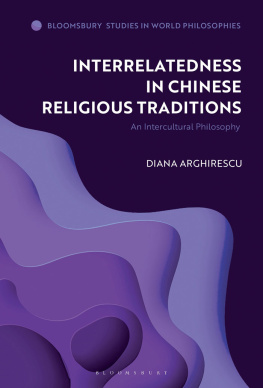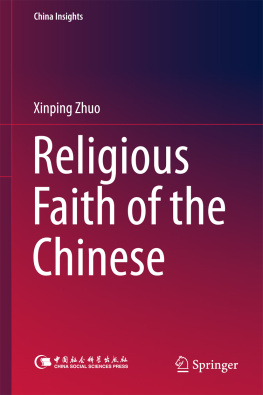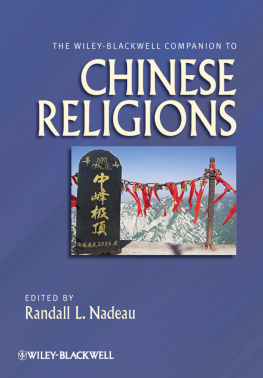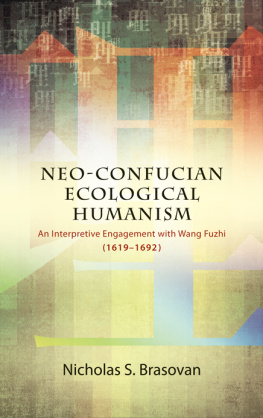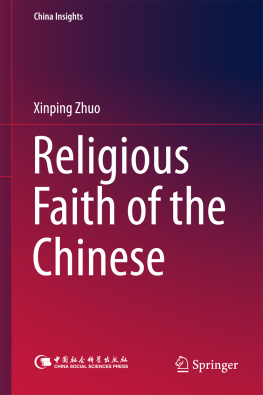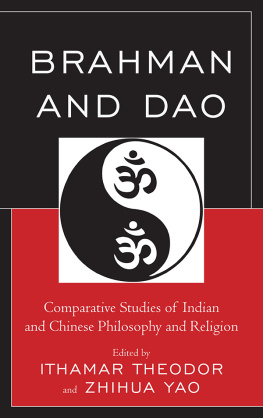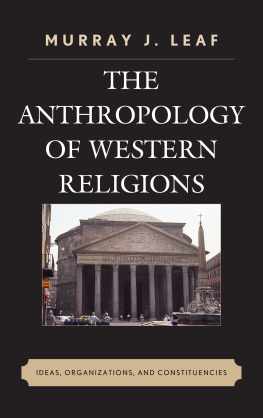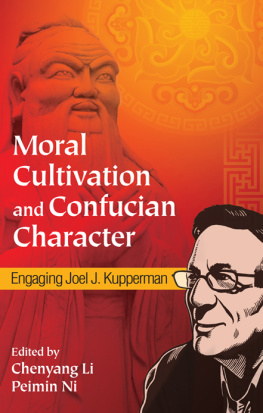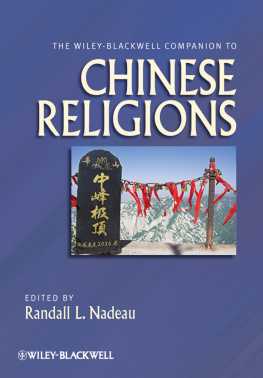
Interrelatedness in Chinese Religious Traditions
Interrelatedness in Chinese Religious Traditions
An Intercultural Philosophy
Diana Arghirescu

BLOOMSBURY ACADEMIC
Bloomsbury Publishing Plc
50 Bedford Square, London, WC1B 3DP, UK
1385 Broadway, New York, NY 10018, USA
29 Earlsfort Terrace, Dublin 2, Ireland
BLOOMSBURY, BLOOMSBURY ACADEMIC and the Diana logo are trademarks of Bloomsbury Publishing Plc
First published in Great Britain 2022
Copyright Diana Arghirescu, 2022
Diana Arghirescu has asserted her right under the Copyright, Designs and Patents Act, 1988, to be identified as Author of this work.
For legal purposes the an extension of this copyright page.
Series design by Louise Dugdale
Cover image Olga Kurbatova/Getty Images
All rights reserved. No part of this publication may be reproduced or transmitted in any form or by any means, electronic or mechanical, including photocopying, recording, or any information storage or retrieval system, without prior permission in writing from the publishers.
Bloomsbury Publishing Plc does not have any control over, or responsibility for, any third-party websites referred to or in this book. All internet addresses given in this book were correct at the time of going to press. The author and publisher regret any inconvenience caused if addresses have changed or sites have ceased to exist, but can accept no responsibility for any such changes.
A catalogue record for this book is available from the British Library.
A catalog record for this book is available from the Library of Congress.
ISBN: HB: 978-1-3502-5685-9
ePDF: 978-1-3502-5686-6
eBook: 978-1-3502-5687-3
Series: Bloomsbury Studies in World Philosophies
Typeset by Newgen KnowledgeWorks Pvt. Ltd., Chennai, India
To find out more about our authors and books visit www.bloomsbury.com and sign up for our newsletters.
Bloomsbury Studies in World Philosophies
Series Editor
Monika Kirloskar-Steinbach
Comparative, cross-cultural and intercultural philosophy are burgeoning fields of research. Bloomsbury Studies in World Philosophies complements and strengthens the latest work being carried out at a research level with a series that provides a home for thinking through ways in which professional philosophy can be diversified. Ideal for philosophy postgraduates and faculty who seek creative and innovative material on non-Euroamerican sources for reference and research, this series responds to the challenges of our postcolonial world, laying the groundwork for a new philosophy canon that departs from the current Eurocentric sources.
Titles in the Series
Andean Aesthetics and Anticolonial Resistance , by Omar Rivera
Chinese Philosophy of History , by Dawid Rogacz
Chinese and Indian Ways of Thinking in Early Modern European Philosophy , by Selusi Ambrogio
Indian and Intercultural Philosophy , by Douglas Berger
Toward a New Image of Paramrtha , by Ching Keng
African Philosophy and Enactivist Cognition , by Bruce B. Janz
Interrelatedness in Chinese Religious Traditions , by Diana Arghirescu
Contents
I developed this interpretive study during an extended period of research in 2020 and 2021. I am most grateful to the Universit du Qubec Montral my academic home for support during this period. The research grants permitted me time free of teaching and administration.
First, I would like to thank my family for their endless support throughout the project. Sincere gratitude to my long-time friend Professor Kirill Ole Thompson from National University of Taiwan, who offered important insights. I also owe him a debt of gratitude for his editorial help. Special thanks to the three anonymous reviewers of my initial project, whose valuable feedback and constructive reviews helped shape this book into its final form. Obviously, any remaining faults of this work are entirely mine.
My thanks go to Colleen Coalter, editor (Philosophy), for believing in this project from the beginning and for guiding me through the books various stages of development. My deepest appreciation and thanks are extended to editors Monika Kirloskar-Steinbach and Leah Kalmanson for their encouragement and helpful comments. A special thanks to Suzie Nash, editorial assistant, for support in this work.
Montral, Universit du Qubec Montral
November 2021
1 Introduction: An intercultural philosophical approach
The study of religions is essential to understanding other cultures as well as to building a sense of belonging in a multicultural world. It supports openness to diversity and intercultural dialogue. This book offers a philosophical hermeneutics of Chinese religions (in particular, Song dynasty Neo-Confucianism and Chan Buddhism), which envisages them as an interrelated group of interlocutors and partners in world interreligious and intercultural dialogue. As the focus of this work is on Song dynasty thought (Chan and Neo-Confucian) and ethical interdependency as one of their major common features, it sets aside the Daoist tradition which has its own interest and is less concerned with social interrelationships. The present hermeneutical reflection might be described as a philosophical practice as well as a method. It aims to meet otherness not within the historical as in the Western interpretive tradition (i.e. through exercising a historical understanding of the thought of another historical epoch) but within the intercultural (i.e. through a comparative interpretation of the Chinese and Western cultural presuppositions).
In particular, as already mentioned, it focuses on a comparative understanding of translations of Song dynasty texts from two major traditions, Confucianism and Chinese Chan Buddhism. This interpretive process has two comparative dimensions: intracultural unveils and interprets the exchanges and connections between Confucianism and Chan during the Song dynasty (9601279); and intercultural discusses Chinese and Western cultural presuppositions based on philosophical translations of classical Chinese works.
This book is the fruit of two of my experiences as a sinologist armed first with a background in Western philosophy but also with specializations in Song dynasty thought and culture and (Western) hermeneutical philosophy. The first experience is related to teaching courses on philosophy of religion as well as Chinese thinking and spirituality regarded as non-Western thought and spirituality that is, from a comparative and intercultural perspective (Western and Chinese as non-Western) to students enrolled in (Western) philosophy and in science of religions programs; the second experience is related to undertaking philosophical and interpretive translations of Song dynasty Neo-Confucian and Chan Buddhist texts.
I define intercultural dialogue as dialogue focusing on reciprocal transformative exchanges and learning between cultures. Unlike the cross-cultural and transcultural projects which look for contrasts and resemblances across cultures considered as case studies and then compare these case studies in order to forge new definitions, concepts, theses and principles, intercultural dialogue is aimed, first and foremost, to develop new relations between cultures through deep, mutual understanding and thus promote mutual intellectual, ethical and spiritual growth. I suggest that, for transformative and formative understanding and growth to occur in the course of such intercultural dialogue, the effort to reciprocally realize and interpret the implicit cultural presuppositions, core values and beliefs, that is, the deeper elements of culture rooted in each of the participant cultures, is necessary. A general observation is that the standard transcultural and cross-cultural studies deal with comparisons at the level of external or peripheral elements of culture: explicit forms of behaviour, environment, sociopolitical organization, moral codes, rituals, aesthetics and so on.
Next page
